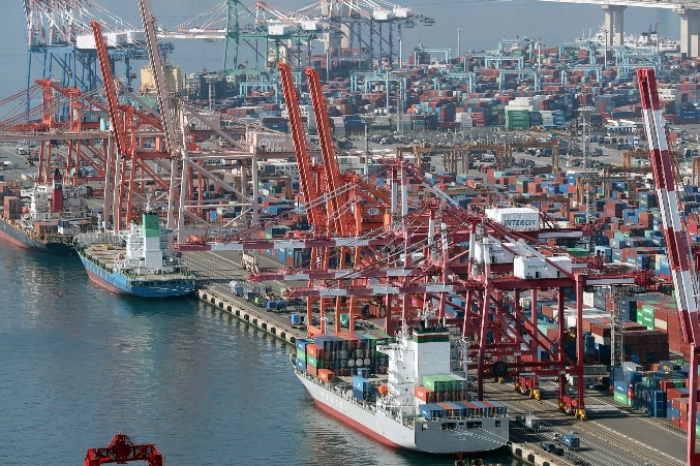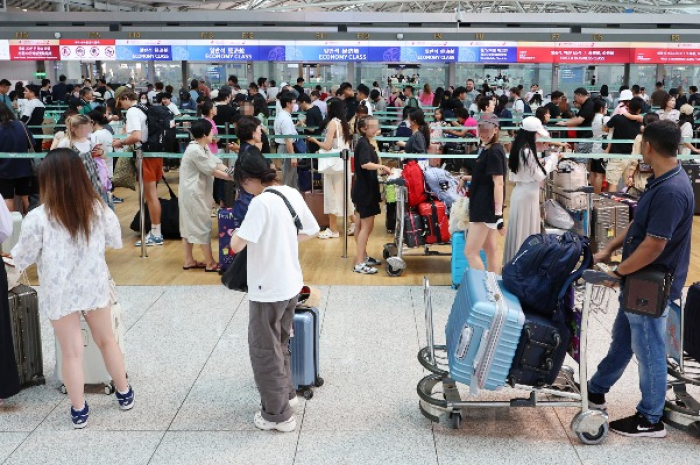Economy
S.Korea posts current surplus on bigger import decline in July
South Korea’s exports in July decreased by $8.79 billion, while imports fell by $13.59 billion
By Sep 08, 2023 (Gmt+09:00)
3
Min read
Most Read
LG Chem to sell water filter business to Glenwood PE for $692 million


Kyobo Life poised to buy Japan’s SBI Group-owned savings bank


KT&G eyes overseas M&A after rejecting activist fund's offer


StockX in merger talks with Naver’s online reseller Kream


Mirae Asset to be named Korea Post’s core real estate fund operator



South Korea maintained a surplus in the current account balance for the third consecutive month in July, driven by its positive goods trade balance on a bigger fall in imports than exports.
Asia’s fourth-largest economy reported a current surplus of $3.58 billion, more than doubling from the same month of last year, according to preliminary data by the Bank of Korea on Friday.
This is the first time in a year that the country has reported a wider surplus from a year ago.
Korea also reported a current surplus for three months in a row in July, the longest surplus streak since the May-July period last year.
The excess was mainly driven by a gain of $4.28 billion in the goods account balance on a larger drop in imports than exports.
RECESSION VS. RECOVERY
Exports in July decreased $8.79 billion, or 14.8%, from the same month last year to $50.43 billion, extending the losing streak for the 11th month in a row.
Imports shrank $13.59 billion, or 22.7%, to $46.15 billion over the same period, raising concerns that Asia’s fourth-largest economy might be in a slump.
South Korea's current account balance in 2023
Unit: Billion US dollars
Source: Bank of Korea
The cumulative current surplus in the January-July period also contracted 77% to $6.01 billion from the same period last year.
But the decline in the country’s exports in August and September has slowed, raising expectations for a recovery in outbound shipments in the fourth quarter, said Lee Dong-won, a senior official at the Bank of Korea, dismissing a recession concern.
The recovery phase, however, hinges on the international oil price, which has recently changed its course north, a factor that could limit the recovery in current surplus, said Lee.
In July, Korea’s commodity and raw materials imports declined 35.7% from a year ago due to a plunge in energy import prices. Imports of gas, coal, crude oil and petroleum products fell 51.2%, 46.3%, 45.8% and 40.9% on-year, respectively.
Inbound shipments of semiconductors and semiconductor equipment also reduced 22.6% and 13.7%, each.
Outbound shipments of petroleum products, semiconductors and steel products contracted 41.8%, 33.8% and 12.6%, respectively.
Korea’s exports to China in the month fell by the biggest 25.1%, followed by Southeast Asia, the EU, the US and Japan.
Korean car exports, however, increased 15.7% over the same period.
WIDER TRAVEL DEFICIT
The country posted a deficit of $2.53 billion in the services account, a whopping 36 times bigger than a year ago on a surge in outbound travel in the post-COVID-19 pandemic era.

The country’s travel account balance logged a loss of $1.43 billion, twice as much as a year ago. This is also the largest travel deficit since January with a $1.49 billion loss.
The primary income added to $2.92 billion from $2.62 billion a year ago but decreased from $4.85 billion in June.
Especially, a surplus in the dividend income account balance was nearly halved to $2.56 billion from a month ago.
Koreans’ direct overseas investments increased by $2.42 billion over the same period, while foreigners’ direct investments in Korea added $1.65 billion.
Koreans’ investments in offshore securities jumped $6.9 billion, the largest since May last year.
Write to Jin-gyu Kang at josep@hankyung.com
Sookyung Seo edited this article.
More to Read
-
 EconomyKorea’s exports down for 11th month in August but at slower pace
EconomyKorea’s exports down for 11th month in August but at slower paceSep 01, 2023 (Gmt+09:00)
3 Min read -
 EconomyKorea’s July factory output slows at fastest pace since February
EconomyKorea’s July factory output slows at fastest pace since FebruaryAug 31, 2023 (Gmt+09:00)
3 Min read -
 AutomobilesS.Korean carmakers post brisk sales on strong exports in July
AutomobilesS.Korean carmakers post brisk sales on strong exports in JulyAug 02, 2023 (Gmt+09:00)
1 Min read -
 EconomyKorea logs current account surplus in May on brisk sales of goods
EconomyKorea logs current account surplus in May on brisk sales of goodsJul 07, 2023 (Gmt+09:00)
2 Min read
Comment 0
LOG IN


